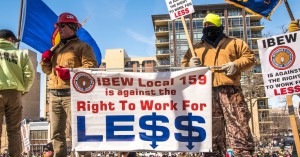 Contradicting arguments typically used to advance so-called Right to Work legislation, new research from the Economic Policy Institute (EPI) shows that wages and benefits are actually lower in states with such anti-worker laws on the books.
Contradicting arguments typically used to advance so-called Right to Work legislation, new research from the Economic Policy Institute (EPI) shows that wages and benefits are actually lower in states with such anti-worker laws on the books.
The paper, released as part of EPI’s Raising America’s Pay project, finds that the negative impact of Right to Work (RTW) laws—which undercut unions by allowing workers to benefit from collective bargaining without having to pay dues—translates to $1,558 less a year in earnings for a typical full-time worker.
“Collective bargaining is a clear way to raise wages, and Right to Work laws undercut it.”
—Will Kimball, Economic Policy Institute
Wages in RTW states are 3.1 percent lower than those in non-RTW states, after controlling for individual demographic and socioeconomic factors as well as state macroeconomic indicators, according to EPI senior economist Elise Gould and research assistant Will Kimball.
In a news release, Gould put it starkly: “It’s abundantly clear that Right to Work laws are negatively correlated with workers’ wages.”
In addition, EPI reports that workers in RTW states are less likely to have employer-sponsored health insurance or pension coverage.
“At their core, RTW laws seek to hamstring unions’ ability to help employees bargain with their employers for better wages, benefits, and working conditions,” explain Gould and Kimball in their introduction. “Given that unionization raises wages both for individual union members as well as for nonunion workers in unionized sectors, it is not surprising that research shows that both union and nonunion workers in RTW states have lower wages and fewer benefits, on average, than comparable workers in other states.”
Right to Work laws are currently in place in 25 states, including Wisconsin, where Republican Gov. Scott Walker signed a controversial RTW bill in early March—saying it was “the right thing to do for job creators and employees alike.” Lawmakers in Illinois, Kentucky, New Mexico, and West Virginia are considering similar legislation.
But rather than enacting policies that act as a drag on workers and the economy, politicians should pursue a different approach, Kimball said.
“Policymakers who are concerned by the three-and-a-half decades of wage stagnation that have plagued American workers should be trying to strengthen unions,” he advised. “Collective bargaining is a clear way to raise wages, and Right to Work laws undercut it.”



